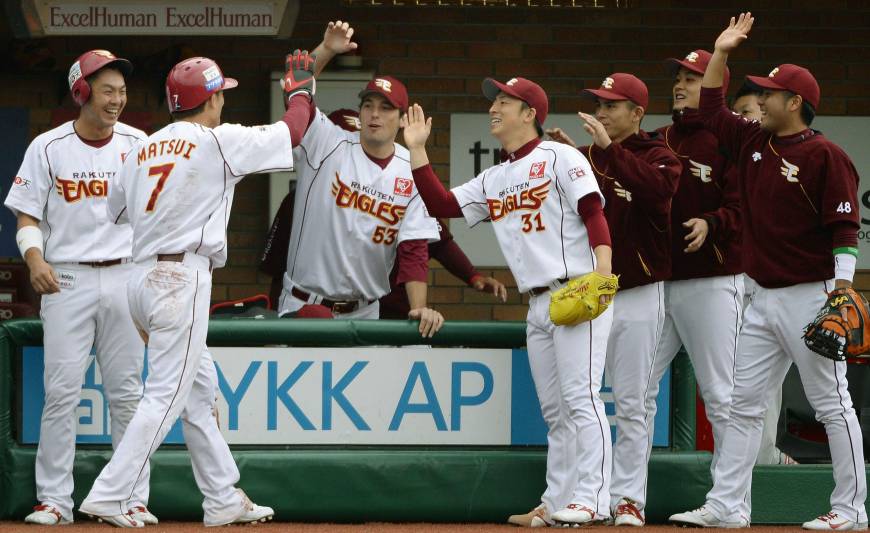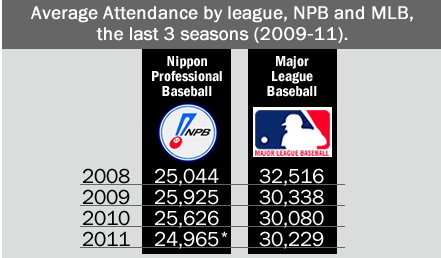The Rakuten Golden Eagles are the reigning Nippon Professional Baseball champions, having won the Japan Series behind strong performances from Masahiro Tanaka and with a roster that included former Major Leaguers Andruw Jones and Casey McGehee. Tanaka has incited much hubub stateside this offseason as he’s set to migrate to a Major League team for 2014 after being the focal point of MLB and the NPB renegotiation of the posting system by which Japanese teams can auction players to the U.S before international free agency.
The new posting system upset Rakuten ownership as it saw their compensation for allowing Tanaka to depart fall from a figure likely close to $60 Million all the way down to $20 Million. Reports suggested that Rakuten did not perceive the NPB as just another of the Minor Leagues from which the MLB could pluck players to showcase in America. Rather, Rakuten considers the NPB another Major League Baseball in a global system similar to what America saw around the turn of the 20th century.
Bobby Valentine, seen by many as baseball’s biggest ambassador to Japan, had this to say in 2008:
“MLB should understand, the game of baseball is too important here in Asia to just take the talent away. What the MLB has to do is think of baseball as being the primary goal and the growth of baseball in the world, not just the growth of individual franchises in the states.”
Time will come soon enough when the Japanese franchises grow weary of the MLB’s stranglehold on talent. The question is: Will we see a truly global Major League Baseball? One in which the Yankees and Red Sox compete in the same league as the Rakuten Golden Eagles or Yomiuri Giants?
Financially, could a Japanese team compete in the Majors?
The new posting system guarantees Rakuten $20 Million for the loss of their Ace pitcher. That figure wouldn’t break the bank for most American teams. Consider: the Rangers paid $10 Million for Michael Young to go play for the Phillies and Dodgers in 2013, and the Braves paid $10 Million for Derek Lowe to go play for the Indians in 2012 (and of course there’s Bobby Bonilla, but that’s alittle different). The 30 Major League teams are set to split $1.5 billion in National TV money annually through 2021 (or each team gets $50 Million a year just from ESPN and TBS).
Meanwhile, the $20 Million that the Rakuten Golden Eagles will get for Tanaka should help the teams’ finances. According to billsportsmaps.com, “Most NPB teams never make a profit, they almost universally lose an estimated average of 50 million dollars per year and some teams are losing much more than that each year. These losses are written off by the corporations that own NPB teams as advertisement expenses. ” (Just for some context, the Eagles’ parent company Rakuten, Inc. is a Japanese electronic commerce enterprise that saw $4.6 billion in revenue in the 2012 fiscal year).
But it’s such a different system (corporate ownership vs. corporate entity), figures for what Japanese teams are making now mean next to nothing. Many MLB teams struggle to make money and compete in an unfair field. The reason–and hope–for a Japanese team is thanks to the Japanese cultural love of the game and attendance figures that, though not on par with MLB averages, are extraordinary. The Yomiuri Giants average about 40,000 in attendance, with the Hanshin Tigers not far behind. When the Mariners and A’s kicked off the 2012 season in Japan, they drew over 44,000 fans and the stadium was 126.1% full. One has to assume that a Japanese team’s attendance figures competing in the MLB would be limited by capacity rather than interest.
Further, an MLB team in Japan would do just fine financially given the frenzy that such a franchise would create. Everyone would buy the hats, t-shirts, jerseys, coffee mugs, candy, and anything else with a logo on it. Meanwhile, tickets to watch the local franchise take on MLB’s best would be harder to get than tickets to the moon. Really, that’s what would drive MLB to consider expanding across the Pacific: A Japanese MLB team would create an excitement never before seen in MLB expansion. The cultural differences would mean a diversification of the sometimes-too-stiff American pastime. Simply, it’d be awesome.
What would become of the NPB?
Giving Japan an MLB presence would assuredly mean that most interest in the NPB would be lost. While that may be true from a television perspective (where Japanese baseball has already been feeling the hurt of mlb.tv), I think the NPB could still hold the attention of some of their dedicated fans. (I’ve got a number of theories and proposals to be spelled out that should keep the NPB relevant in the face of an American invasion.) Moreover, the new MLB franchise might give Japanese baseball even more market share.
Logistical Obstacles: Travel and Timing
The NFL would love to move the Jaguars to Britain. NFL commissioner dictator Roger Gooddell has said he wants a team in both London and L.A. and it doesn’t matter which happens first. My money is on LA because of the travel and time difficulties of London. The NFL only plays just once a week, so any problems they are considering around travel or time change would be felt seven fold with the non-stop MLB schedule.
A flight from New York to Tokyo is roughly 14 hours. A flight from Tokyo to LA is roughly 11 hours. Moreover, Tokyo is 14 hours ahead of Eastern Standard Time. The powerful MLBPA would stand for none of that long distance traveling and juggling of players’ internal clocks. The good news is that I’ve thought up some interesting ways to make it work.
Potential Solutions
Double Headers
Perhaps the easiest way to alleviate travel problems is something that baseball writers have been asking for for years now. The players likely would not be too happy about flying to Japan on a Thursday, playing a four game set (Friday, Saturday, and two on Sunday) before flying back on Monday or Sunday night. Losing two off days to travel is probably not the most enticing way to sell this idea, but the potential financial kickback may be enough to deafen players’ outcry.
81 home, then 81 road
Our faux Japanese franchise could play 81 games at home, then play 81 games on the road (or vice versa). Such a set up would minimize their travel expenses, while also guaranteeing the long travel experienced by other clubs would at least be consolidated to the first half of the season. I really like the idea of the Japanese team traveling around America for three months straight. It would be like those victory tours that NBA teams used to go on throughout Asia except for three months and meaningful.
The Japan Month
What’s the best way to not have to travel to Japan as often? Travel to Japan less often. In this scenario, we send three teams over to Japan and they duke it out for a month before sending three more teams across the pond. Let’s say the new Japan franchise (I really should have come up with a name for it by now) is in a division with the Mariners, A’s, and Angels. All three travel over to Japan and while the Mariners/Japan play, the A’s and Angels play on some other field. Then they rotate through thrice (each team plays a total of 9 series) before heading stateside. The scenario is effectively half of the division games in a month and takes care of 30 home games for the Japanese team. I’m not sure that losing home games will be such a big deal in a culture as enthusiastic about baseball as Japan. If the Yomiuri Giants can draw 40,000 for 140 games a year, couldn’t the A’s and Angels bring in 40,000?
The Loser Bowl: Relegation/Promotion
Obvious tanking has nearly ruined the NBA. Baseball is far less susceptible to such scenarios, but bottoming out strategies in recent years has taken proud franchises like the Astros, Cubs, and Twins into the depths of unwatchability. Creating a Relegation and Promotion system from the existing minor league framework is nearly impossible because of the ownership of the respective teams and the necessity of the different levels in developing young players.
But what if MLB said OK, the best Japanese team gets a chance to play the worst MLB team in a best-of-7 series every year to determine who gets to play in The Show the next year?
In this scenario, we keep the NPB unbelievably relevant and important. Under the system in which the MLB expands to Japan, there would be a new franchise in Japan and the Relegation/Promotion series would pit existing MLB teams against NPB teams.
I haven’t quite figured out if I would keep the new Japanese team (assuming they win the Loser Bowl Best of 7 and get to play in the MLB) in Japan or if they should then take over the stadium, organization and uniforms of the Loser Bowl. Should this essentially be a high stakes poker match in which the owners and players are playing to switch jobs? Or something more expansive where we have the possibility of a few MLB organizations stationed in Japan?
Some combination of the Loser Bowl and The Japan Month would make a whole lot of sense. Two or three Japanese teams to be played on one trip to Japan would be the ideal for travel considerations.
Tradition! What becomes of the divisions?
Frankly, I don’t care. For years, we played in a system in which the AL West had 4 teams and the NL Central had 6. The powers that be have remedied that arithmetical problem, but there is still an unbalanced schedule that results in teams playing more games against better opponents thanks to geography. The 2013 Rays played 96 regular season games against teams above .500, while their Wild Card game foe faced 8 fewer such teams. The unbalanced schedule makes Billy Beane’s “unfair game” even less fair.
So, while we’re incorporating a Japanese team into the American (and Canadian) pastime, it is time to eliminate divisions and leagues. Without delving too deeply into what I would do if I were Commissioner for a Day, in the Loser Bowl scenario, maintaining traditional divisions would become too much of a mess. If the thought of each team playing every other team the same number of times proves too much for people, teams could be grouped according to geographic proximity and play more games against their “natural rivals,” Leagues and Divisions be damned. Whatever happens, an expansion team in Japan would hopefully rein in the end of the divisional era. But, what do we call this new era?
How a Japanese expansion becomes a reality:
It will be tough. In the face of owners’ willingness to discuss contraction, bad vibes from the NFL and NBA where over-expansion has engendered a daunting gap between the good and bad, and the reality that the MLB has a long history of insularity from international competition (How do you have a World Series without the rest of the world? ((A true World Series featuring the MLB Champion, NPB Champion, Cuban National Series Champion (((or some team from the tangled web of the Cuban baseball league system))), and Mexican League Champion would make for some real drama.)) But I digress; I’m not the Commissioner, even for a day.), an expansion team popping up in Japan is anything but forthcoming. So what are the steps needed to make it become a reality?
A new forward thinking Commissioner would help. Bud Selig is set to retire at season’s end and there are few candidates to replace him. Selig has ushered in an era of good attendance, better television deals, and instant replay. Currently, the discussions for Commissioner candidates begin and stop with mid-and-small market teams getting a voice. While that must remain a focus, the new commissioner’s stance on expansion (the league has not expanded since 1998), the DH rule synthesizing across both leagues, and the continuous fight against PEDs will be vital to MLB’s future. A forward thinking Commissioner, one ready and willing to shake up baseball’s traditions and conventions, would certainly pave the way to expansion to the Far East.
Faster air travel would also be nice. With commercial flights direct from Seattle to Tokyo taking just under 10 hours, the biggest impediment to a Japanese team is simply time. Until Montgomery Scott’s space travel system from Star Trek becomes a reality, Japanese baseball will be fighting an uphill battle to really integrate. It should be noted that there was a similar sentiment felt before MLB’s expansion to the west coast. Before air travel became commonplace, the thought of traveling coast to coast meant long train rides for which MLB players felt ill-suited. But change happens quickly in travel.
A Japanese billionaire with a passion for bringing a franchise across the Pacific could do the trick. Forbes lists 22 Japanese business people as Billionaires, with 10 of them successfully crossing into the world of “multi-billionaire.” One of them has to like baseball enough to become the voice of the Japanese expansion. One of them has to see how a Japanese MLB team would only add to their portfolio. We’ve seen the changes that a new owner can mean to an existing franchise with the Dodgers. An aggressive Japanese billionaire pursuing expansion across the Pacific could have similar clout.
At the end of the day, baseball is flourishing in the states. The MLB saw more than $8 Billion in revenue in 2013 and has enough passionate fans to convince us that writing this blog is a good idea. A move to Japan would further globalize the game, further expand baseball’s reach, and would likely not be a bad business endeavor.
I’ve experienced first hand how baseball is a global sport. I’m ready to see MLB take that next step.
-Sean Morash

















